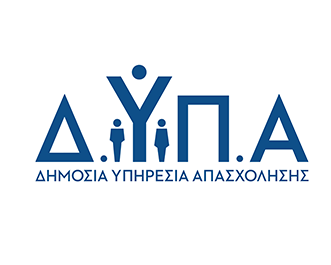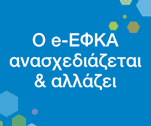K. Hatzidakis: We should close down the “back door” of the certification process
K. Hatzidakis: We should close down the “back door” of the certification process
The Minister of Economy and Finance and former Minister of Labour and Social Insurance (2021-2023), Mr. Kostis Hatzidakis, stressed the significance of upskilling training and certification programmes during the discussion titled "Skills for a new economy". The discussion took place in the framework of the event for the European Year of Skills titled "Empowering Greece with Skills for a Sustainable Future" which was organised by the Greek Public Employment Service (DYPA).
"We introduced the "payment by Results" principle to the Ministry of Labour, a principle applying to both the training bodies and the training beneficiaries. Have we reached our goal? No, not yet. And we need to try even harder, particularly in terms of the certification process. We should close down the “back door” of the certification process. Once there will be a proper certification process, then there will be proper training. We need to stop the mockery of people pretending to offer training and others pretending to receive this training", stated Mr. K. Hatzidakis.
The Minister of Economy and Finance also pointed out the fact that if Greece wishes to move onto the new economic era, then special emphasis must be placed on three factors: human capital, digital skills and lifelong learning. "Lower taxes, lower insurance contributions and a modern labour legislation alone simply will not do the trick. The idea that a person will be able to work his/ her whole life just by having one, single bachelor degree is obsolete. In Greece we still suffer from the 80’s perception that the ‘life owes us’. We have to get rid of this mindset. We have to free ourselves from this idea. The government is trying to change this mentality in the public sector too." said Mr. Hatzidakis. When asked about the establishment of private universities he replied that "it is clear that we need rivalry and even more options. And non-state universities can only have a positive impact".
The Minister of Labour and Social Security, Ms. Domna Michailidou, stated: "The Ministry of Labour and Social Security in collaboration with DYPA and while continuously discussing with the Social Partners places great value on the Active Labour Market Policies’ implementation and future designing and reskilling in order to cover the skills gap arising into the labour market. For instance, Integrated Employment Programmes are programmes that combine a series of interventions such as Employment Counselling, Training, Employment and Entrepreneurship. Furthermore, with funds from the RRF, DYPA currently implements a training and employment programme for unemployed persons aged 25-45. We also plan to implement actions that will support women's entrepreneurship, micro-financing of new businesses, counselling and work experience actions for various groups of unemployed persons. However, to achieve our goal a collective effort is required, with the participation of the government, the private sector and the citizens themselves. Our aim is to promote the culture of lifelong learning as well as an environment encouraging innovation and equal access to opportunities for all. By investing in the skills of our fellow citizens we can pave the way towards a sustainable and prosperous future, inclusive for all citizens of Greece.”
Ms. Manuela Geleng, Director for Skills at the Directorate-General for Employment, Social Affairs and Inclusion, European Commission stressed the importance of offering employees the opportunity to reskill as well as the key role that "supplementary" skills are going to play in assisting artificial intelligence. She also added: "Europe does not count on its raw materials, our competitiveness lies in the human resources, innovation and ingenuity. Digital skills are in the centre of attention globally and artificial intelligence is growing but we also need the skills that will complement artificial intelligence, skills such as critical and rational thinking, etc"
Ms. M. Geleng added that there is a need to offer opportunities and tools to the employees wishing to train and reskill, and also noted the important role of certifying various skills. "In many sectors businesses require different skills, this way we can grow our candidates' pool for a job post with persons that may not have the necessary qualifications but possess the skills for that particular post".
Ms. Maria Nikoltsiou, a reporter for Alpha TV, and Mr. Antonis Fourlis, a reporter for the website Huffingtonpost.gr, coordinated the discussions.
The Minister of Health and former Minister of Labour and Social Security (2023-2024), Mr. Adonis Georgiadis, referred to the introduction of new technologies and skills in the sector of health during the discussion titled "The Digital Agenda of Social Transformation". "It is a great honour for me to participate in the DYPA event for the European Year of Skills" said Mr. A. Georgiadis. "As the former Minister of Labour and Minister of Health now one of the biggest issues I need to tackle is labour shortage and especially skilled labour shortage. Obviously, this is not an issue only for Greece but for Europe too. We have to not only highlight the issue but also to find ways to solve it. When I was Minister of Labour I had an impeccable collaboration with DYPA and Mr. Protopsaltis and I have absolute confidence in the work DYPA does. Things are even more complicated in the health sector where I am now responsible but I am certain that we will do our best in that sector too to employ the necessary solutions for the labour shortage. The key issue of skills can and will be addressed because now we have the necessary expertise and training and learning programmes funded by the Resilience and Recovery Fund and of course the EU contribution is assisting us in our path towards the European social and financial development".
The Minister of Digital Governance, Mr. Dimitris Papastergiou stated, inter alia: "We should not fear the revolution in digital technologies and Artificial Intelligence (AI). Without doubt there are certain occupations that will become extinct and will be replaced by new occupations. The key difference in the AI era is the implementation of training actions in the field of digital skills which will align to the technological data and requirements of our time. We all need to work quickly and flexibly, each from his or her own post to strengthen the citizens in acquiring knowledge and skills on the emerging technologies. At the same time, though, along with reskilling and upskilling we must not forget core elements such as the cultivation of empathy and emotional intelligence which will enable us to counterbalance Artificial Intelligence".
"We need to pay extra attention on the quality and certification process of the training. We also need to have greater visibility for our actions if we want to attract the part of the population that is not in training or employment" admitted Ms. Gianna Hormova, DYPA Deputy Governor. And she also added that "We need to change the very culture of learning and development. This is what we are attempting to do in DYPA" while at the same time stressing the advantages of both horizontal and digital skills.
Ms. Gianna Andronopoulou, General Director of Microsoft Greece, Cyprus and Malta, commented on the great appeal of programmes aimed at women and the need for more training programmes for persons aged 40+. "Artificial intelligence causes changes in the way we live and work, we need to build skills much faster than before. We need an adaption culture." said Mr. Andronopoulou. And then she added that training programmes have to start from an early age and that artificial intelligence can contribute greatly in the DYPA educational and training programmes with personal assistants for the trainees.
"We live in a golden era" thinks Mr. Panagiotis Petrakis, Emeritus Professor at National and Kapodistrian University of Athens, who also warned that in the coming years we will face even greater difficulties and that one of the reasons for this will be the labour shortage. "We need to get people out of their homes and bring them back into the labour market" commented and added that a relevant survey has proved that citizens have not exactly comprehended what is the importance of green and digital skills.
Ms. Maria Nikoltsiou, coordinated the discussion as well as the next one with DYPA VET graduates who shared their experience from participating in such programmes and talked about how quickly they found their first job. Ms. Chara Kalpakou, beneficiary of the DYPA VET programme for Digital & Green Skills, is now a supervisor in a centre for Training and Lifelong Learning (KEDIVIM). She explained that she was unemployed for a long time and while searching for a way out she found out about the DYPA programme which helped her re-enter the labour market almost immediately. Mr. Panagiotis Kolokythas, beneficiary of the DYPA VET programme on "Geographic Information Systems (GIS): Data Management - Web Applications", stated that he is totally satisfied and also added that it is important to enrich one's knowledge.
Ms. Amalia Kyprioti is an Oreokastro DYPA EPAS apprentice of gold- or silversmiths. She said that her academic studies did not help her enter the labour market and DYPA EPAS helped her turn her hobby into a job. She added that she immersed herself 100% into this particular sector and made new acquaintances. Her apprenticeship gave her the opportunity to go on and now she is a professional gold- and silversmith. On her part Ms. Valeria Migeleva, beneficiary of the DYPA VET programme on Digital Marketing, stated that she had worked for several years in the catering and sales sectors. When she learned about the DYPA programme, she decided to register and train in digital marketing, a very good and useful experience according to her.
Click here to download the Press Release
































